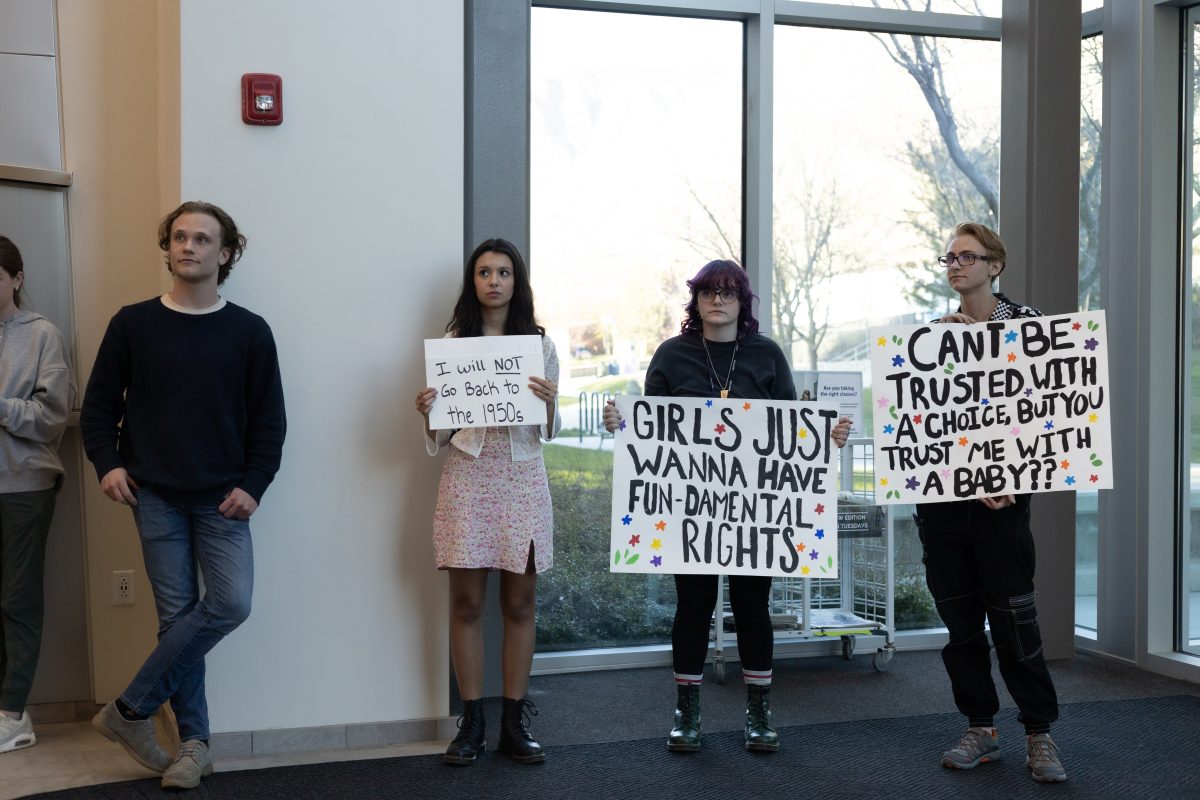“We are the 99 percent.”
This is the slogan that sparked the beginning of the occupation of Zuccotti Park in Lower Manhattan, New York City, as part of the Occupy Wall Street/Occupy Together movement. The movement has gained widespread attention from mainstream media across the world and sparked other cities — from Boston to Sydney and from Cape Town to Rome — to join in the rally.
The protesters have been targeting a range of issues, including a growing wealth inequality between the very rich and the extremely poor, as well as what they claim to be corporate greed and corruption both in the financial sector and government. The debate from both sides of the political spectrum on the legitimacy of the protesters has been increasing as the days go on.
Last weekend, the Occupy movement came home to Ogden. The following are four profiles of members of the Weber State University community who discuss whether they are for or against the protests. The rally began on Nov. 5 at 10 a.m. at City Hall Park on 25th St. and Washington Boulevard. The organizers set up a Facebook page for protesters and curious minds alike to engage in conversation about the protest.
Shalie Barber

Hometown: Morgan, Utah
Graduation year: 2013
Field of study: Political science; public administration (minor)
On-campus role: WSU Student Association, senator for the College of Social and Behavioral Sciences
Job description: Student; waitress; intern at the South Ogden City Manager’s Office
‘Occupy’ status: Currently not planning to attend rally
To begin, Barber made clear her opinions about protests. While she said she supports an individual’s right to protest, she believes the best way to bring policy change is by “petitioning legislature and approaching the issue diplomatically.” Specific to the Occupy movement, Barber said she believes it is a “great idea, implemented poorly.”
As a student of political science, Barber is well traveled. Having visited China, Italy and Moldova along with others, Barber has had the opportunity to gain a diverse view of the world. Barber said she has been able to see how conflict and inequality can lead a country to become torn or scared. It is because of this, she explained, that she feels the need for all parties to come together and have the conversation about policy change and the direction of the country. Barber reiterated, however, that this conversation must be had in an appropriate way, whether through city council meetings or other means.
“It reflects poorly on the city’s administrators for not being able to reach out and inform the citizens of the city that they have the opportunity to engage in this conversation,” Barber said, regarding the movement’s arrival in Ogden.
Cliff Nowell, Ph.D.

Hometown: Goldensbridge, N.Y.
Job description: Associate dean, professor of economics in the John B. Goddard School of Business and Economics
‘Occupy’ status: Plans to attend rally
Nowell was one of the original six people who began the conversation about Occupy Ogden.
“I suppose . . . because I think the movement belongs everywhere,” Nowell said, as to why Ogden was chosen for the rally. “Most of the Occupy issues are national issues.”
Nowell explained he was motivated by observing the lack of opportunity that his 21-year-old has. This is, Nowell explained, where his heart his. However, other protesters said they have different issues which they present and different outcomes they hope to achieve. Nowell said he believes there is a beauty in this.
“It is not seeking a single outcome, but the ability to influence the discussion,” he said.
Nowell said because the gap between rich and poor over the last 25 years has grown at “astronomical rates,” leaving the middle class at a great disadvantage, “policy needs to be changed.”
“Before that (policy change) can happen, we need to show our frustration,” he said.
Leah A. Murray, Ph.D.

Hometown: Schenectady, N.Y.
Job description: Associate professor, department of political science and philosophy, College of Social and Behavioral Sciences
‘Occupy’ status: Currently not planning to attend rally
One of the many questions buzzing through mainstream media about the Occupy movement is what tangible effect it might have on national policy.
“It is too early to tell,” Murray said.
Murray said research suggests that all generations have a need to claim that big events in their lifetimes are pivotal moments in history. The trend, as Murray explained, is something that needs to be looked at closely. The rise of social media such as Facebook and Twitter have made mass social movements such as the Arab Spring, the Modern Tea Party and the Occupy Together movement possible. This American Autumn has benefited, Murray said, from the fact that all types of information are available almost instantly.
“It is nothing new that people are uncomfortable with protests,” Murray said, in response to the criticism against it and the attempts to shut down these protests and rallies. “We embrace it (the right to protest) in the abstract, but typically become uncomfortable when it happens.” On the other hand, Murray said for some, the movement is important simply because “it is cool to protest.”
As to whether a solution can be attained, Murray repeated her previous sentiments that it is too early tell, mostly due to lack of sufficient data. However, she said she believes whatever solution is presented must “correspond with American values” in order to be a real solution.
McKenna Hanson

Hometown: Palmer, Alaska
Graduation year: 2014
Field of study: Spanish, chemistry (minor)
Future goals: Plans on attending optometry school
Job description: Student; barista
‘Occupy’ status: Plans to attend rally
“I am kind of afraid for this generation’s future,” Hanson said. “. . .I am afraid that things are going to get harder and harder.”
Hanson said this thought motivated her to learn more about the Occupy movement. Hanson made it clear she is no expert in economic policy, but she said, even though she is still skeptical about the movement, she is excited to “share ideas with other people and engage in the conversation.” Hanson addressed some of her clear points of contention, however, and said the difficulty of paying for school and the unfair series of economic policies coming from Washington, D.C., need to be changed.
One of the many difficulties for this movement nationwide is the apparent lack of organization at times. However, Hanson said that “people’s hearts are in the right places.” She also said people’s willingness to sit down and learn is “inspiring.” Responding to criticism surrounding a stigma placed on the protestors as “entitled, elitist college students,” Hanson said, “People are engaging in the political process, and it is important that we use this opportunity to raise awareness of the issues and to educate.”














